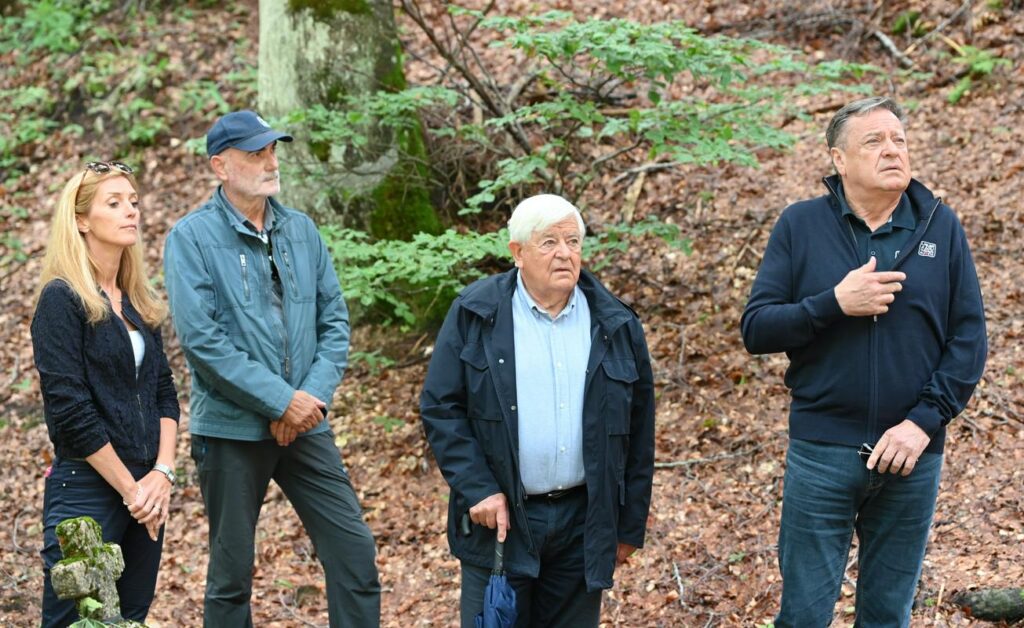The annual commemorative ceremony was recently held at the Russian Chapel to pay tribute to the memory of the deceased Russian prisoners. In the past, the ceremony at Vršič was an elite event where representatives of the Slovenian left strengthened their ties with the Russian state top. But just like last year, this year’s event was also organised in a limited format, with no participation of the domestic state leadership. However, the last leader of the Slovenian communists, Milan Kučan, and the Mayor of Ljubljana, Zoran Janković, did attend it. The event was also attended by Zmago Jelinčič Plemeniti, who laid flowers at the memorial on behalf of his Slovenian National Party (Slovenska nacionalna stranka – SNS).
The commemorative event was organised by the Slovenia-Russia Association, which sent a message to the media after the event, stating that commemorating past wars and the loss of human lives contains a message of peace and calls for coexistence between peoples and religions. “Our presence at this site is a renewed expression of respectful remembrance and a call for peace and understanding between people and between nations,” they added. Soon after the start of the Russian invasion of Ukraine, the Association condemned the aggression and called on the Russian leadership to stop the aggression immediately.
Here is what they wrote at the time: “With every kilometre that Russian tanks travel, the civilisational distance between Moscow and our capitals increases. We, therefore, call on the Russian state leadership to immediately halt military activities against Ukraine and prevent further loss of life, suffering, and destruction on the territory of a sovereign neighbouring country.”
This is a condemnation that Zoran Janković and Milan Kučan have so far failed to make. The latter, shortly after the start of the aggression, divided the blame for the war between the two sides, and then, in the year and a half since the aggression began, has repeatedly spoken out in favour of an immediate ceasefire. Nova24TV has repeatedly reported that this is a widespread strategy adopted by influential pro-Russian people around the world. The immediate start of peace negotiations would force Ukraine to give up more of its own territory than it would otherwise have to, if it succeeded in liberating more of the occupied territory.
Meanwhile, the Mayor of Ljubljana is still the bearer of the Order of Friendship he received from Putin in Moscow a few years ago – unlike former Minister Anja Kopač Mrak, who also received the same decoration but returned it after the invasion began. Janković tried to explain his decision in a press release, saying that he believes in diplomacy until the end.
The event at the Russian Chapel was also attended by Zmago Jelinčič, who placed a wreath of flowers at the memorial. He wrote on Facebook: “On behalf of the Slovenian National Party, I laid flowers in memory of the victims of the avalanche in World War I, the Russian prisoners of war. #RussianChapel” These days, Jelinčič is promoting the idea of a multipolar world, promoted jointly by Russia and China.
Jože Colarič, the President of the Management Board of the company Krka, and Riko’s CEO Janez Škrabec allegedly also attended the event.
“It would cause too much of a scandal.”
As already mentioned, this year’s event was not attended by the national leadership. “President Nataša Pirc Musar, Prime Minister Robert Golob, Speaker of the National Assembly Urška Klakočar Zupančič, State Prosecutor General Drago Škete, and the head of the Supreme Court Miodrag Đorđević, will not be present at the Russian Chapel. It would cause too much of a scandal,” wrote editor and journalist Peter Jančič.
However, before the invasion, things were very different. Representatives of the left-wing political elite were swarming to attend the event, which was also attended by Dmitry Medvedev at one point, and, a year later, even Vladimir Putin himself. Some went even further than just attending the event. “The Russian chapel has been declared a cultural monument of national importance by the government of Miro Cerar, and also as a symbol of Russian-Slovenian friendship,” Jančič reports. Miro Cerar is also one of the few politicians followed on Twitter (or X) by Dmitry Medvedev, former President and Prime Minister of Russia. Medvedev follows only 16 people. And Cerar is one of them.
The chapel was built by Russian prisoners of war
The Russian Chapel under Vršič was built in 1916 by Russian prisoners of war in memory of their comrades who died in an avalanche during the construction of the Vršič mountain pass, reports the Slovenian Press Agency (STA). After the First World War, the chapel was cared for by local people. In 1937, during the reconstruction of the road, a number of graves of deceased prisoners were found, and their remains were buried in the ossuary next to the chapel, above which a stone pyramid was erected. The wooden chapel deteriorated over the years, but it was later conserved, and the deteriorated were parts restored in 1991. In 2006, it was completely restored.
Ž. K.


